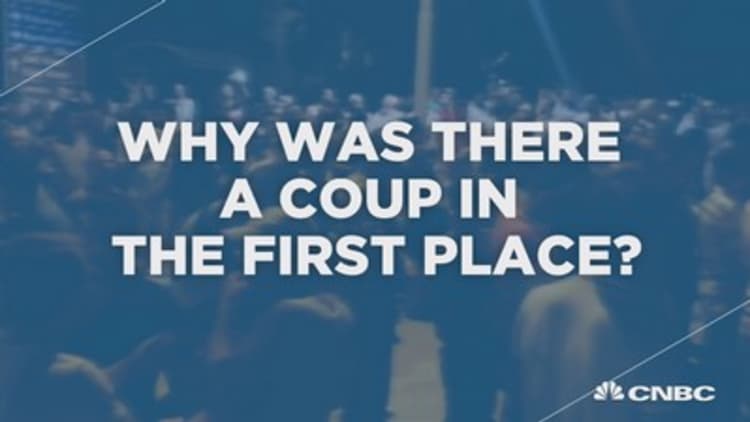
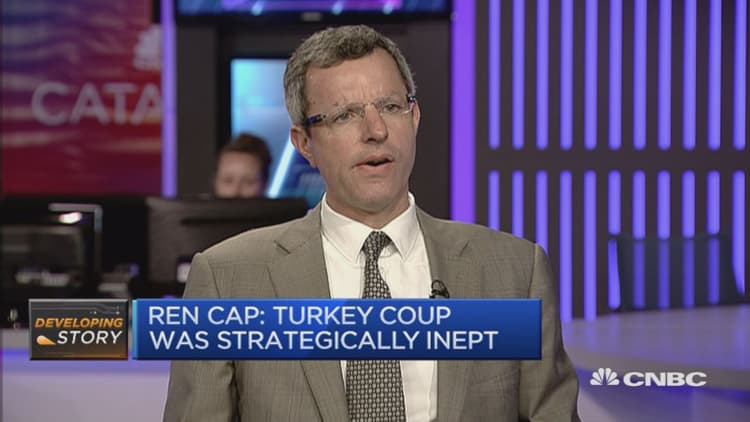
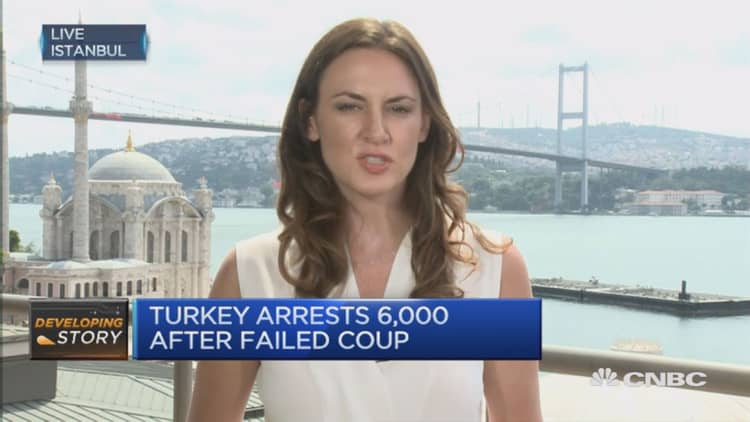
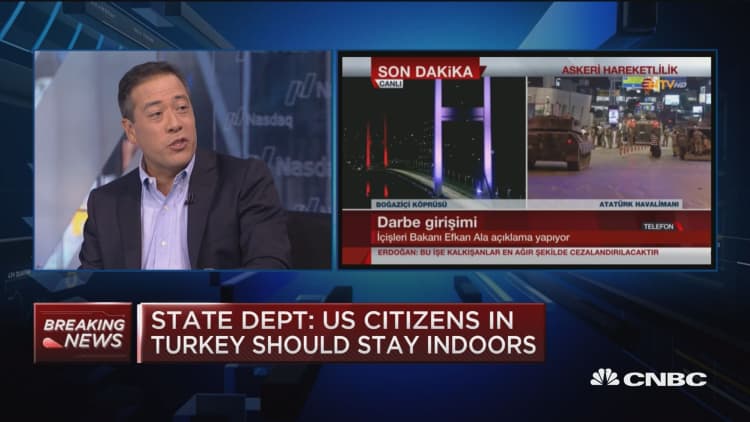

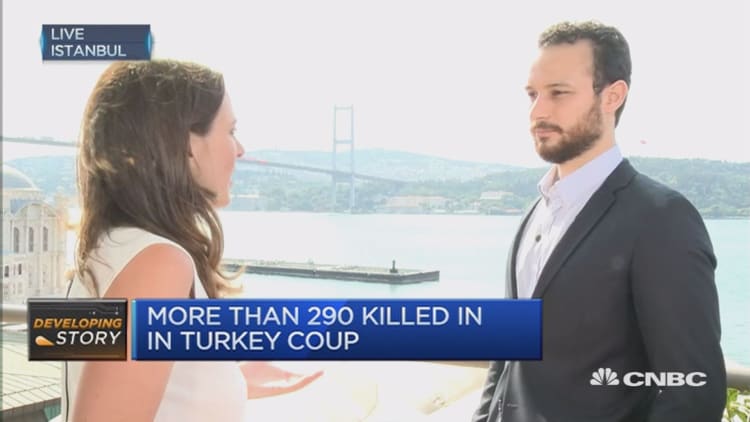
In the wake of the failed attempt this weekend by a group of military rebels to seize power in Turkey, the country's political establishment is firmly in the spotlight with analysts worried about what the quashed coup could mean for the country's place on the world stage.
The failed putsch prompted the country's strongman president, Recep Tayyip Erdogan, to round on his opponents. At the moment up to 6,000 people – including prominent members of the military and judiciary – have been arrested.
The coup is largely seen as failing due to a lack of public support, lack of organization and unanimous military support and, generally, international backing for Erdogan's democratically elected government -- in spite of widespread misgivings over his increasingly autocratic rule.
CNBC looks at the implications of the failed coup:
More power for Erdogan?
While Erdogan's supporters around the world have criticized the coup, leaders have warned the president not to use the failed uprising an excuse to consolidate his power: Erdogan has been pushing for constitutional reform that would create an executive presidency, further concentrating his power.
European foreign ministers, meeting in Brussels Monday, commented that Erdogan had to respect the "rule of law" and called for restraint. However, the fact that all political parties united in opposition against the coup could potentially allow for less polarization in the domestic political scene, according to one analyst.
Doruk Ergun, research fellow at the Istanbul-based EDAM research foundation, told CNBC on Monday that although Erdogan doesn't have "a good track record," he said that the fact that all political parties were united against the coup potentially allowed for less polarization in the domestic political scene.
"We have immensely high levels of political polarization in the country and this gives them (Erdogan and his allies) a good opportunity to not demonize the opposition and to see them as partners in restoring Turkey's democracy as is their responsibility."
Rule of law
Erdogan, who founded the ruling conservative and Islamist AK party, vowed revenge for the uprising and promised that he would purge state institutions of what he called a "virus."
For the most part, however, Erdogan has blamed Fethullah Gülen, a political opponent who lives in the U.S., of orchestrating the plot and called for his extradition to Turkey. Gülen has denied the allegation and has said Erdogan could have staged the coup himself as a pretext for clamping down on his opponents and restricting human rights.
Following the coup attempt, Erdogan called for the reinstatement of the death penalty which was abolished in 2004 as part of the country's ambitions to join the European Union (EU).
Concerns have also been expressed over the treatment of those arrested this weekend after images showed handcuffed soldiers who appeared to be stripped to their underwear. Anthony Skinner, head of Political Risk at risk consultancy Verisk Maplecroft, said in a note on Monday that Erdogan was likely to become more "ruthless."
"His reflex response when challenged by civil society or opposition groups over recent years has been a combination of defiance, confrontation and intimidation," Skinner remarked.
"A coup attempt is an altogether different ballgame compared to the comparatively innocuous Gezi Park Protests of 2013 or even the more impactful corruption probe and detention of key Erdogan allies by Gulen supporters later that year. Erdogan is taking no prisoners. Government officials are even contemplating whether to reinstate the death penalty for treason."
Security and terrorism
The coup attempt has also prompted concerns over Turkey's role in fighting Islamist militant group the so-called Islamic State to the East.
Turkey is one of the West's key allies in the fight against ISIS in Syria, which borders Turkey. The country is also seen as a "gateway" to Europe. The EU, which has seen an influx of refugees from the region due to the Syrian civil war, reached a deal with Turkey last year to restrict the flow of migrants in return for financial aid and relaxed visa requirements for Turkish citizens.
Complicating matters, however, is Turkey's long-running conflict with Kurdish separatists in the south-east of the country belonging to the Kurdistan Workers' Party (PKK). Despite both Turkey and the PKK (and its affiliates in Iraq and Syria) fighting ISIS, the Kurds have accused Turkey of using the fight against ISIS to attack them.
Verisk Maplecroft's Skinner noted that Erdogan's current "purge" of plotters in the army "is likely to land yet another blow to the country's already stretched defences" and that "Turkey's slipping armour will be exploited by the PKK."
"Turkey's allies in NATO have stood in solidarity behind Erdogan and his government, although the president's response to the coup attempt could well place relations with key Western allies under greater pressure."
Tourism, investment and the wider economy
Aside from the geopolitical ramifications of the coup plot, focus has turned to Turkey's economy and how it might weather the political upheaval at home.
Turkey's economy is largely reliant on tourism and it has already been numbers affected by a spate of bomb attacks by ISIS and Kurdish separatists over the last few years. The latest large-scale attack was on Istanbul's airport in June in which 41 people died and hundreds were injured, damaging the country's important tourism industry further. As an emerging market, however, Turkey was an attractive investment opportunity for many investors looking for higher-yielding investments.
On Monday, Turkey's currency and main stock index had also reacted positively to the political status quo being maintained.
The Turkish lira, which fell more than 5 percent against the dollar following news of the coup attempt Friday, had recouped losses by Monday to trade at 2.9398 against the dollar (compared to 2.90 before the incident).
Turkey's main stock index, the Borsa Istanbul 30, was trading 3.6 percent lower although the relatively shallow decline surprised analysts.
EDAM's Doruk Ergun said the muted market reaction was down to swift and easy quashing of the coup attempt and the political unity against the plot. However he noted that any future foreign investment in Turkey would likely depend on Erdogan's next political moves.
Citi Research's analysts Luis Costa, Ilker Domac and Gultekin Isiklar said in a note on Monday that they believed that "Turkey's already challenging macroeconomic backdrop has become even more complicated."
"Given the country's large external financing needs (of about $190 billion per annum), the possibility of a shift in investor sentiment towards Turkish assets can have significant implications for real economic activity – particularly if one considers the large open FX position of the corporate sector ($192 billion)." They added that a "likely slowdown in economic activity may lead policymakers to pursue more expansionary monetary and fiscal policies."
"In our view, a ratings downgrade could further undermine macroeconomic and financial stability. In this respect, while we believe that the likelihood of a downgrade has increased, the rating agencies are likely to observe the policy response before taking any actions," they noted.
Alastair Newton, Co-Founder & Director of Alavan Business Advisory, told CNBC on Monday that the investment case for Turkey should be based on fundamentals rather than short-term events.
"Certainly yes, we've seen a lot of things happen in Turkey recently that have been out of leftfield but I think the key point here, the coup notwithstanding, is that Erdogan's position has, I believe, been strengthened significantly by these events and in that respect I would expected in the medium-term that its domestic politics would become more predictable albeit in a region where we're likely."
- CNBC's Hadley Gamble contributed reporting to this story.


